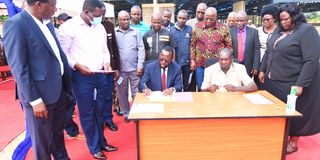Why Uhuru market remains a ghost town

Kisumu Governor Anyang' Nyong'o and Nyanza Regional Commissioner Magi Mutindika sign a document that handed over Uhuru Business Park Market Complex from the national to the county government Wednesday.
One would have expected a mad rush by traders to occupy the Uhuru Business Park after its official launch.
But that hasn't been the case.
The market, one of the major fruits of the handshake between President Uhuru Kenyatta and ODM leader Raila Odinga, remains deserted, with only a handful of traders having taken up spaces.
The Sh600 million multipurpose market was meant to house more than 5,000 traders, whose structures were removed to pave the way for the upgrading of the Sh3 billion inland port and old railway line.
The project started in 2019 after Kenya Railways and the county government reached a deal on a seven-acre plot where the market is located.
The new market was built to accommodate traders who were displaced from Lwang’ni, Winmart, Varsity Plaza, Akamba line, Fontana, Konyando, KPLC, Bank Street and Lake Market.
Small-scale traders’ shops on Kisumu streets and Kenya Railways land were demolished.
The demolitions were meant to pave the way for modernising and rehabilitating the Kisumu port.
The land was surrendered by Kenya Railways to Kisumu to accommodate the evicted traders.
The furthest end of the market is occupied by a few women who run a fish eatery.
The other open sheds that were to house traders dealing in second-hand clothes, fresh produce, furniture and blacksmiths have remained empty.
But Lwang’ni traders chairman Hezekiah Okello said whereas most fish traders moved to the Dunga beach, few have occupied Uhuru Business Park.
Traders feel the location is too far for their customers.
"With time, traders will come to the market. This place is far from the town area. That's why traders are yet to start doing business here," Mr Okello said.
Last year, there was a standoff between Kisumu County and the national government over how space at the market was being dished out.
A public notice from City Manager Abala Wanga said the complex was to open only to successful balloted traders.
Mr Wanga noted that this would be for traders who possessed genuine ballots verified by the market management team.
The matter was later resolved.
But County Director for Trade Bovince Ochieng said traders are free to occupy the stalls as soon as they are ready.
"The reason they might have not occupied the market space is that they were affected by the Covid-19 pandemic and the current hard economic times," Mr Ochieng said in a phone interview.
The market has 20 open sheds to be partitioned and fitted with lockable stalls and platforms to accommodate the needs of traders.
"A committee will be formed at both levels of government, namely the national and county government, to oversee the budget for the construction of stalls so that traders can move in," he said.





